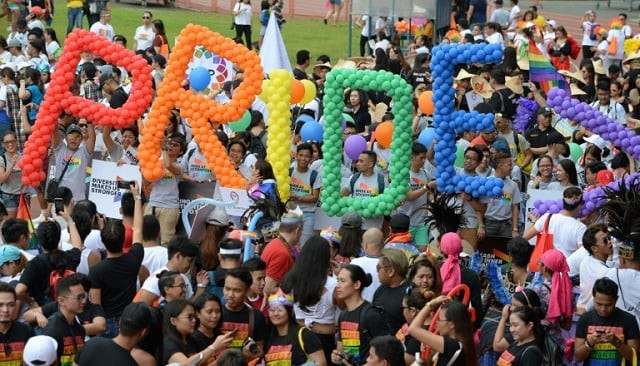Rally for equality as top Philippine court considers gay marriage
Marchers face uphill struggle in the conservative, largely Catholic country where even divorce is illegal

But despite its conservatism, the Philippines has shown growing social tolerance with several transgender and gay figures achieving celebrity status and a transgender politician getting elected to Congress in 2016. PHOTO: AFP
Many of the marchers acknowledged they faced an uphill struggle in the conservative, largely Catholic country where even divorce is illegal.
"We also deserve the civil rights of society. More than the idea of love, [this march] is really about getting respect of other people," said high school senior Leo Baltar, 19, one of the marchers.
Police estimated some 7,000 people joined this year's pride march, many of them dressed in drag or in mardi gras-like costumes as they flew rainbow-hued banners and balloons.
The march came just days after the Supreme Court wrapped up hearing oral arguments seeking the legalisation of same-sex marriage.
Rainbow flags fly across Europe at Gay Pride parades
The challenge, brought by gay lawyer Jesus Nicardo Falcis, argues the current law limiting marriage to heterosexual couples breaches the country's constitution.
Legal analysts are doubtful the case will prosper in a country where 80 percent of the population is Catholic and where even legalisation of divorce and abortion face huge opposition.
Independent research group Social Weather Stations released a nationwide survey on Saturday showing that 61 percent of the population oppose legalisation of same-sex unions.
The survey of 1,200 adults nationwide, conducted in March, found that only 22 percent said they supported such "civil unions".
But despite its conservatism, the Philippines has shown growing social tolerance with several transgender and gay figures achieving celebrity status and a transgender politician getting elected to Congress in 2016.
"We have achieved so much... (but) so far, we only have tolerance," rally participant Ja Quintana said.
"We do not have complete acceptance because we don't have equal rights. The reality is it will not take a few years but will take many years. But there is more than just a chance. The fight doesn't stop until we have achieved equality".



















COMMENTS
Comments are moderated and generally will be posted if they are on-topic and not abusive.
For more information, please see our Comments FAQ